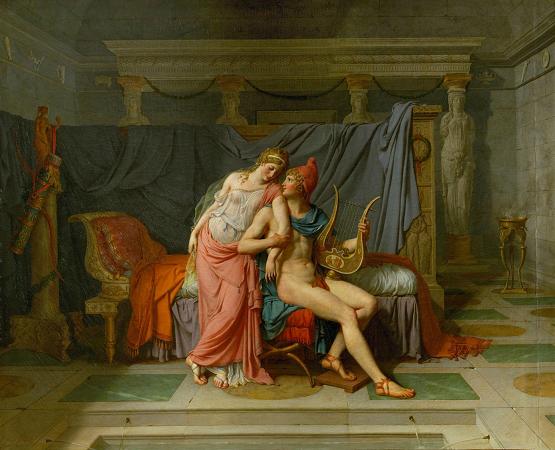Paris. Paris, also known as Alexander, the son of King Priam and Queen Hecuba of Troy, appears in a number of Greek legends. One of the most famous stories associated with Paris is the Judgment of Paris, in which he was asked to choose the most beautiful goddess among Hera, Athena, and Aphrodite. Paris is often depicted in art as the central figure in this scene, holding the golden apple that he awarded to Aphrodite as a symbol of her victory. Paris is also often depicted with Helen of Troy, the woman whose abduction by Paris sparked the Trojan War. In these depictions, Paris and Helen are often shown together in romantic or intimate scenes, emphasizing their love affair. He was also a warrior who fought in the Trojan War. In some depictions, he is shown wearing armor and carrying weapons, emphasizing his martial prowess. Paris was a child of Priam and Hecuba. Just before his birth, his mother dreamed that she gave birth to a flaming torch. This dream was interpreted by the seer Aesacus as a foretelling of the downfall of Troy, and he declared that the child would be the ruin of his homeland. On the day of Paris's birth, it was further announced by Aesacus that the child born of a royal Trojan that day would have to be killed to spare the kingdom, being the child that would bring about the prophecy. Though Paris was indeed born before nightfall, he was spared by Priam. Hecuba was also unable to kill the child, despite the urging of the priestess of Apollo, one Herophile. Instead, Paris's father prevailed upon his chief herdsman, Agelaus, to remove the child and kill him. The herdsman, unable to use a weapon against the infant, left him exposed on Mount Ida, hoping he would perish there. He was, however, suckled by a she-bear. Returning after nine days, Agelaus was astonished to find the child still alive and brought him home in a backpack to rear as his own. He returned to Priam bearing a dog's tongue as evidence of the deed's completion. Paris's noble birth was betrayed by his outstanding beauty and intelligence. While still a child, he routed a gang of cattle-thieves and restored the animals they had stolen to the herd, thereby earning the surname Alexander. It was at this time that Oenone became Paris's first lover. She was a nymph from Mount Ida in Phrygia. Her father was Cebren, a river-god or, according to other sources, she was the daughter of Oeneus. She was skilled in the arts of prophecy and medicine, which she had been taught by Rhea and Apollo, respectively. When Paris later left her for Helen, she told him that if he ever was wounded, he should come to her, for she could heal any injury, even the most serious wounds. Paris's chief distraction at this time was to pit Agelaus's bulls against one another. One bull began to win these bouts consistently. Paris began to set it against rival herdsmen's own prize bulls and it defeated them all. Finally, Paris offered a golden crown to any bull that could defeat his champion. Ares responded to this challenge by transforming himself into a bull and easily winning the contest. Paris gave the crown to Ares without hesitation. It was this apparent honesty in judgment that prompted the gods of Olympus to have Paris arbitrate the divine contest between Hera, Aphrodite, and Athena. In celebration of the marriage of Peleus and Thetis, Lord Zeus, father of the Greek pantheon, hosted a banquet on Mount Olympus. Every deity and demi-god had been invited, except Eris, the goddess of strife. For revenge, Eris threw the golden Apple of Discord inscribed with tei kallistei, For the most beautiful, into the party, provoking a squabble among the attendant goddesses over for whom it had been meant. The goddesses thought to be the most beautiful were Hera, Athena, and Aphrodite, and each one claimed the apple. They started a quarrel so they asked Zeus to choose one of them. Knowing that choosing any of them would bring him the hatred of the other two, Zeus did not want to take part in the decision. He thus appointed Paris to select the most beautiful. Escorted by Hermes, the three goddesses bathed in the spring of Mount Ida and approached Paris as he herded his cattle.
more...













